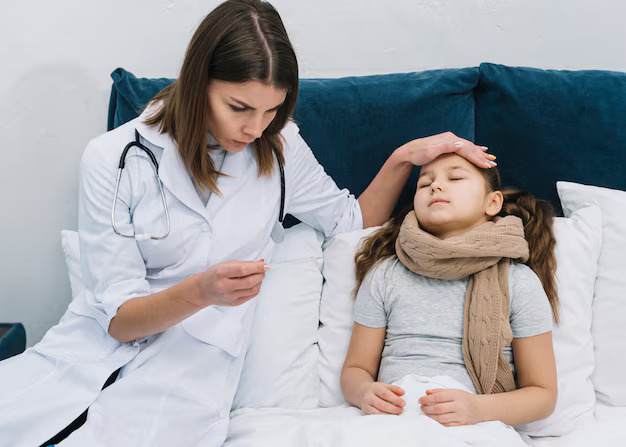Childhood is an exciting journey full of growth, adventure, and learning. However, it’s also a time when children are prone to various illnesses as their immune systems develop. While many of these illnesses are mild, some can be serious and require medical attention. As a parent, being aware of the most common childhood illnesses and their treatments is essential for keeping your child healthy.
In this comprehensive guide, we’ll delve into the top common childhood health problems, their symptoms, and how pediatricians approach diagnosis and treatment. We’ll also explore ways you can support your child’s health and when to seek professional care from the best pediatrician in Thane.
The Role of Pediatric Care in Childhood Health
Pediatricians are essential in ensuring a child’s overall well-being. These doctors are specialists trained to care for children from infancy to adolescence. Pediatricians not only treat pediatric diseases, but they also offer preventive care to ensure your child grows up healthy. Some of the critical functions of a pediatrician include:
- Conducting regular physical exams to monitor growth and development
- Administering essential immunizations
- Prescribing safe medications for various pediatric disease conditions
- Providing care for injuries like fractures
- Offering guidance on healthy lifestyles
A trusted pediatrician becomes a valuable partner for parents in maintaining their child’s well-being. Early diagnosis and effective pediatric treatment are essential in managing most childhood illnesses, ensuring the child can quickly recover and thrive.
10 Common Childhood, and Illnesses and Their Treatment
Let’s explore 10 of the most common childhood illnesses, their symptoms the recommended pediatric treatment options.
1. The Common Cold
A frequent visitor in households with children, the common cold is a viral infection affecting the upper respiratory tract. Symptoms include:
- Runny nose
- Congestion
- Sneezing
- Sore throat
- Mild fever
Pediatricians diagnose the common cold based on symptoms and recommend treatment focusing on symptom relief, such as rest, hydration, and over-the-counter medications. Antibiotics are not effective for viral infections.
2. Ear Infections
Ear infections, particularly otitis media (middle ear infections), are common in children. Symptoms include:
- Ear pain
- Tugging at the ear
- Difficulty hearing
Pediatricians use an otoscope to examine the ear canal and eardrum for infection. Treatment for bacterial infections includes antibiotics, while viral infections may only require pain relief and close monitoring.
3. Gastroenteritis (Stomach Flu)
Stomach flu, orgastroenteritis, is characterized by:
- Diarrhea
- Vomiting
- Stomach cramps
This viral infection is diagnosed based on symptoms, and the main treatment goal is preventing dehydration. Pediatricians advise offering fluids like oral rehydration solutions to maintain hydration.
4. Hand, Foot, and Mouth Disease
A common viral illness in children, this disease presents with:
- Fever
- Mouth sores
- Rash on hands and feet
Pediatricians typically diagnose this illness based on the characteristic rash. Treatment focuses on managing symptoms through pain relievers, fever reducers, and ensuring hydration.
5. Chickenpox
While less common due to vaccinations, chickenpox is still a significant childhood illness marked by:
- Itchy rash with red spots and blisters
- Fever
- Fatigue
Pediatricians diagnose chickenpox by examining the rash and may prescribe antihistamines for itching and acetaminophen for fever.
6. Asthma
Asthma is a chronic condition affecting children’s airways, leading to:
- Wheezing
- Coughing
- Shortness of breath
Pediatricians diagnose asthma through a review of medical history and lung function tests. Treatment involves inhaled corticosteroids and bronchodilators to manage inflammation and open airways.
7. Bacterial Sinusitis
Bacterial sinusitis occurs when bacteria cause inflammation in the sinuses, leading to:
- Persistent nasal discharge
- Daytime cough lasting over 10 days
- Fever
Pediatricians diagnose this condition through symptom observation and prescribe antibiotics if necessary, alongside decongestants and pain relievers.
8. Sore Throat (Strep Throat)
While viral sore throats are common, strep throat caused by streptococcal bacteria requires medical attention. Symptoms include:
- Severe sore throat
- Fever
- Swollen lymph nodes
Pediatricians perform a rapid strep test to diagnose the infection and prescribe antibiotics to clear the bacteria. Completing the full course of antibiotics is essential to prevent complications.
9. Urinary Tract Infection (UTI)
UTIs are more common in girls but can affect both sexes. Symptoms include:
- Pain during urination
- Frequent urination
- Abdominal pain
Pediatricians diagnose UTIs through urine tests and prescribe antibiotics. It’s important to encourage your child to drink fluids to help flush out the bacteria.
10. Bronchiolitis
A common viral infection in children, bronchiolitis causes:
- Coughing
- Wheezing
- Difficulty breathing
Pediatricians diagnose bronchiolitis based on physical symptoms and recommend supportive care such as humidified air and hydration. Monitoring breathing and oxygen levels is crucial, especially for younger children.
Preventing Pediatric Diseases
While it’s impossible to prevent all childhood illnesses, there are steps parents can take to reduce the likelihood of pediatric disease conditions. Some preventive measures include:
- Keeping vaccinations up to date
- Encouraging frequent handwashing
- Teaching children to cover their mouths when coughing or sneezing
- Cleaning commonly touched surfaces
- Promoting a balanced diet rich in fruits, vegetables, and proteins
- Ensuring children get regular exercise and sufficient sleep
Building healthy habits from a young age will go a long way in preventing many common childhood health problems.
The Role of Parents in Pediatric Care
Parents play an active role in their child’s healthcare by staying informed and involved. Here are some ways parents can support their child’s health journey:
- Regularly monitor your child for signs of illness
- Keep a close relationship with the best pediatrician in Thane
- Follow prescribed treatment plans carefully
- Create a positive environment at home through healthy meals, exercise, and cleanliness
- Don’t hesitate to seek professional medical advice when unsure about your child’s symptoms
Conclusion: Trust Pediatric Experts for Your Child’s Health
Childhood health is a complex and dynamic field, but understanding common childhood illnesses equips parents to make informed decisions. While this guide offers valuable insight into pediatric diseases, each child is unique, and professional medical advice is indispensable for accurate diagnosis and treatment.
If your child exhibits signs of any of these conditions or you have concerns about their health, don’t hesitate to consult the best pediatrician in Thane at Lifecare Annexe. Early intervention ensures better outcomes, giving your child the best chance to grow up healthy and happy.







